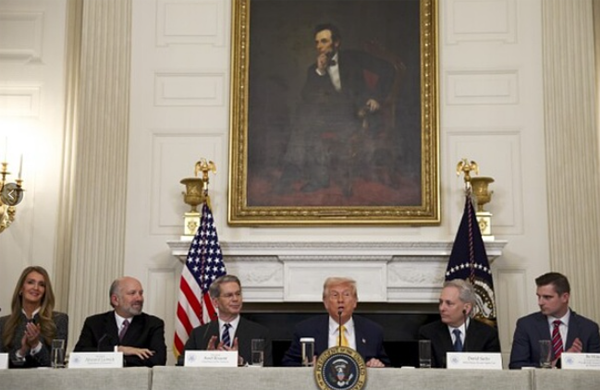Summary of the White House Cryptocurrency Summit: Policy signals released and regulation significantly relaxed

The White House held a cryptocurrency summit, which attracted heavyweights from government regulators, Congress, industry leaders and the investment community. The summit marked a major shift in the US government's policy attitude towards the cryptocurrency industry, with issues such as stablecoin legislation, bank regulation relaxation, and crypto asset custody becoming the focus of attention.
The policy signals released by the meeting indicate that the US government is actively adjusting its regulatory attitude towards cryptocurrencies. The policy adjustment led by the Treasury Department has led the US Internal Revenue Service (IRS) to plan to revoke and revise previous tax guidelines on Bitcoin and cryptocurrencies, a move that the market sees as a major positive for reducing tax uncertainty.
At the same time, the US Office of the Comptroller of the Currency (OCC) reiterated that the federal banking system can legally custody crypto assets, hold deposits as stablecoin reserves, and use blockchain technology to promote payment business. This move not only provides compliance support for banks to get involved in digital asset business, but may also promote further integration between banks and the crypto industry.
In addition, the meeting revealed that some restrictive bank regulatory policies implemented during the Biden administration are being gradually revoked, including what the crypto industry calls "Chokepoint 2.0" - the bank's blockade of cryptocurrency companies. The Trump administration plans to repeal relevant policies, and the OCC has officially started the process of revoking the guidelines. This means that the banking industry may enter the cryptocurrency market more actively and provide broader financial support for the development of the industry.
At the same time, Trump made it clear at the summit that he hopes Congress can pass stablecoin legislation before the August recess, indicating that regulators are accelerating the compliance of stablecoins and paving the way for their application in the global payment and financial system.
In addition to adjustments at the policy level, the meeting also discussed industry innovation, market transparency and ethics. The Trump administration proposed a "crypto renaissance" plan to unleash the growth potential of the crypto industry and promote economic growth through this field. At the same time, it is worth noting that Trump downplayed the term "cryptocurrency" in the meeting and preferred to use "digital assets". This change in wording may mean that the US government hopes to redefine the industry in a broader and mainstream way to promote the entry of institutional investors.
David Sacks, the White House AI and cryptocurrency director, said in a subsequent speech that the cryptocurrency industry has suffered legal repression and persecution in the past four years and has been involved in a terrible "legal battle". Therefore, he is very grateful to President Trump for his understanding of legal fairness and his willingness to fight for justice and fairness.
Scott Bessent, the U.S. Treasury Secretary, believes that with President Trump signing an executive order to formally establish a strategic Bitcoin reserve and digital asset reserve, the United States will establish its leadership in the global digital asset strategy. The United States must realize this reality and stay ahead of other countries in the digital age.
Howard Lutnick, the U.S. Secretary of Commerce, Kelly Loeffler, the Small Business Administration Director, Tom Emmer, the House Majority Whip, and Sergey Nazarov, the founder of Chainlink, also spoke to express their gratitude to President Trump for promoting cryptocurrency-related policies.
Brian Armstrong, the CEO of Coinbase, said after the summit that the company plans to add 1,000 employees in the United States, encouraged by the clarification of regulations. This move shows that a clear regulatory framework will directly promote the development of the industry and attract companies to expand their investment in the United States. In addition, the conference attracted the participation of many key industry figures, including SEC Commissioner Hester Peirce, CFTC Acting Chair Caroline Pham, and Lightspark CEO David Marcus, whose presence further highlights the increasingly close dialogue mechanism between government and industry.
The summit attracted many key industry figures, including Coinbase CEO Brian Armstrong, Lightspark CEO David Marcus, CFTC Chairman Nominee Brian Quintenz, and Kresus Founder and CEO Tegan Traina. In addition, SEC Commissioner Hester Peirce and CFTC Acting Chair Caroline Pham also spoke on the spot. It is worth noting that former SEC Chairman Nominee Paul Atkins did not attend, and the Acting Director of the Office of the Comptroller of the Currency Rodney Hood only attended the pre-conference reception.
Overall, the White House Cryptocurrency Summit not only shows that the US government's attitude towards digital assets is changing, but it may also lay the foundation for the future regulatory framework. Issues such as stablecoin legislation, tax policy adjustments, and banks' participation in digital asset business will become the focus of industry attention in the coming months. If Congress can push forward relevant legislation as scheduled before the August recess, the crypto industry may usher in new development opportunities.









